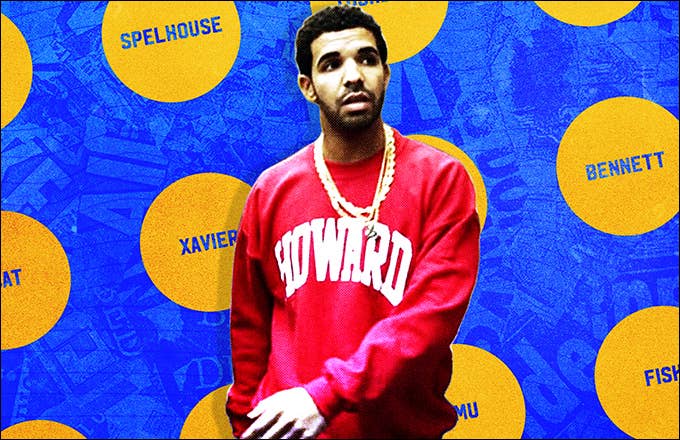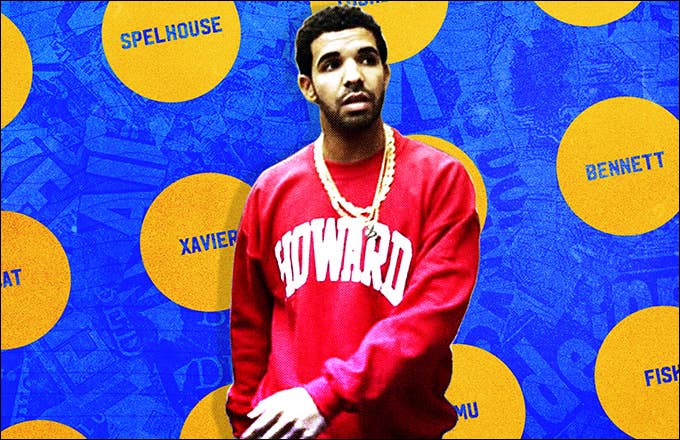
Understanding the impact that HBCUs have on African-American youth, The Home Depot has committed to revitalizing HBCU campuses through its Retool Your School Campus Improvement Grant Program. To date, the program has awarded over $2 million towards campus improvement projects to help sustain our nation’s HBCUs, ensuring that their legacy and contributions to the larger culture of the United States continue on.
Many whisper about the sort of controlled chaos that exists during homecoming, but only HBCU students and alumni can truly speak to the weekend’s significance. For many students of color, homecomings are a concentrated dose of life on campus; a seamless stretch of parties and pride soundtracked by the music of the moment. As HBCUs are seen as centers of blackness and cultural shifts, their celebration of black music is as natural as it is necessary, given that black artists often shoulder the same responsibilities.
Throughout the years, the love has been reciprocated. Whether it be Drake shouting out Jackson State and Grambling’s marching bands on If You’re Reading This It’s Too Late, or Beyonce bringing the traditional black homecoming experience to Coachella Valley, the culture’s biggest superstars have always displayed appreciation for black universities, even in spaces where there may not be a single HBCU grad in sight.
As the fall semester has come and gone, now feels like an appropriate time to dig through the crates and revisit hip-hop’s two-decade-long love affair with historically black colleges and universities.
Howard University: the Capital of the Culture
The homecoming of all homecomings (depending on who you ask), Howard University’s extended celebration of black joy and excellence has become famous for its live performances. If not for its late October start date, Howard’s homecoming would rival more than a handful of small festivals throughout the summer.
Ever since The Notorious B.I.G. put on an unforgettable performance at Yardfest alongside Diddy and Foxy Brown in 1995—largely regarded as one of the most memorable moments in Howard homecoming history—the university has held a special place in the hearts of young black folks everywhere.
Just a four or five hour drive from Brooklyn, the DC-based festivities remained a priority for Biggie on his 1997 classic “Kick In The Door.” Rapping, “Ain’t no telling where I may be / Might see me in D.C. / At Howard homecoming / With my man, Capone, dumbing.”
That time when Biggie lived his lyrics and stepped on the yard for Howard Homecoming!!! You had to be there!!! HU you know!!! pic.twitter.com/TxhYTIHubk
And thus, the tradition of shouting out one of the most prestigious HBCUs in the country was born. In 2012, Drake caused a mass hysteria when he made a special guest appearance at the school’s homecoming concert during 2 Chainz’s performance. The surprise set came just one year after the Torontonian released his Take Care single “Make Me Proud,” a song on which he admires a young woman for being smart enough to attend Yale, but culturally committed enough to attend Howard. For students too young to have witnessed Biggie’s set, seeing Drake hit the homecoming stage outfitted in a Howard University sweatshirt definitely provided a moment just as special.
Legends in the AUC
Out-of-town rappers may have an affinity for Howard, but no other group has embraced any HBCU the way Atlanta’s homegrown talent has historically celebrated the AUC. A consortium of three Atlanta-based black colleges, the AUC consists of Clark Atlanta University, Spelman College, and Morehouse College. All three schools have been referenced by legends the likes of Ludacris, as well as underrated hit-makers such as Trinidad James.
Perhaps the most memorable shoutout came when Andre 3000 detailed a precarious dilemma on 1998’s “Skew It On The Bar B.” On the song, the OutKast rapper describes juggling two love interests—one who attends CAU, and another who attends Spelman. To truly show their love for Atlanta HBCUs, Andre and his rhyming partner Big Boi enlisted actual AUC students for the performance scenes in the song’s music video, shot in Atlanta’s famous Tabernacle concert hall.
The most anthemic reference to the AUC came via Gucci Mane’s 2010 album Mr. Zone 6, on which the rapper claims to run his circle like Morehouse, surrounding himself with men dedicated to his cause, as Morehouse is an all-men school. Gucci then went on to name drop almost every major fraternity and sorority in the AUC, proving his knowledge of Atlanta’s network of black universities is unmatched.
Queens of Spelman
A common theme throughout many of hip-hop’s references to HBCUs is the infatuation rappers seem to have with women who attend them—none more-so than the women of Spelman.
As Morehouse’s all-women sister school, Spelman College is home to some of the smartest, most driven women you’ll find on any campus. Ranked first among the top 25 HBCUs as of 2018, Spelman has produced women coveted by corporate America, nonprofits, all three branches of government, and nearly every rapper hailing from Atlanta. Even non-Atlanta born rappers like Chicago’s Common and Oakland’s Too $hort have referenced the women of Spelman in their lyrics.
With artists from all over the country singing the school’s praises, Atlanta’s own Childish Gambino delivered hip-hop’s most descriptive depiction of what Spelman women mean to the city. Gambino’s 2014 track “Dream/Southern Hospitality/Patna Dem” is as much an ode to Spelmanites as it is a tribute to the rapper’s hometown.
Serving as the intro to Glover’s mixtape STN MTN, the three-part song begins with the Atlanta-born rapper detailing what life would be like if he were king of the city. Included in his royal fantasy, the Golden Glide skating rink on Wesley Chapel Road plays his music, defunct nightclubs such as 112 and Jazzy T’s are reopened, the Atlanta Braves once again play at Turner Field, LaFace Records is back on the charts, Chick-Fil-A is open on Sundays, and he routinely cruises down Memorial Drive with a Spelman woman by his side to help oversee it all.
As Bennett College, the only other all-women HBCU in the country, continues to fight to keep its accreditation, eyes are on the students of Spelman in particular as fellow historically black institutions are being called on to lend their support. Beyond the homecomings, marching bands and academics, the sense of community that exists between HBCUs is what’s most parallel to hip-hop.
Drumlines compete just as MCs spar in cyphers, and black scholars document and dictate culture in a similar vein as black artists—all for the benefit of each other. With hip-hop being the most dominant force in mainstream music, both its admirers and architects remain skeptical of outsiders seeking to capitalize off its ubiquity. But so long as the need exists for HBCUs, hip-hop will always have a space to receive and reciprocate love amongst familiar faces.
